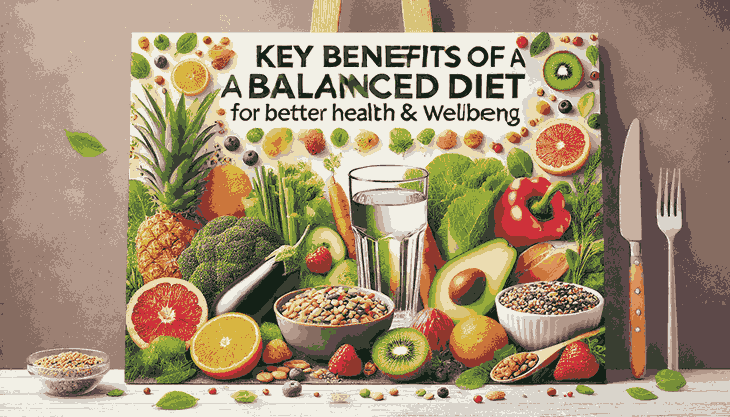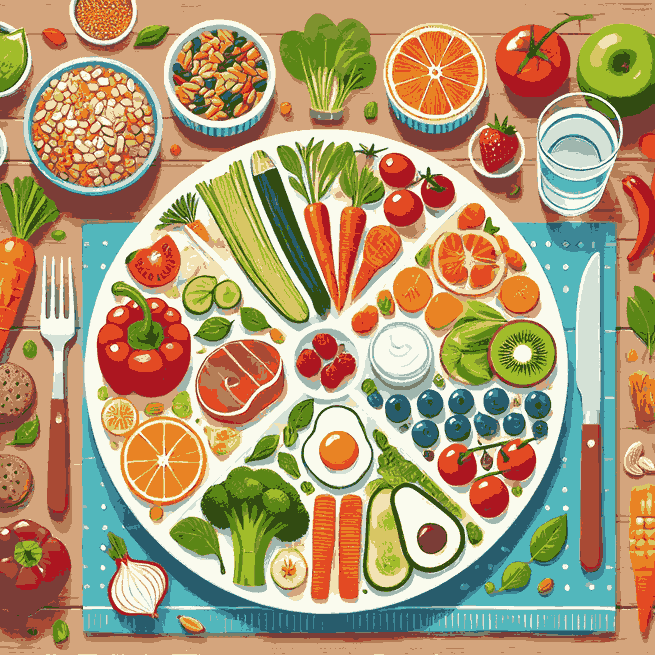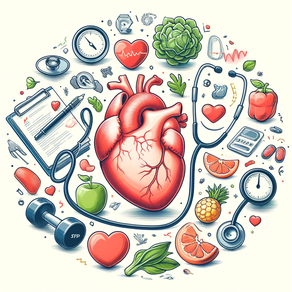
Why a Balanced Diet is Important
Maintaining a balanced diet is one of the most effective ways to achieve better health and well-being. From providing essential nutrients to boosting energy, the benefits of a balanced diet are vast. This blog will help you explore why balanced nutrition is key to a healthy lifestyle, how you can make better food choices, and what benefits you can expect when focusing on your health through diet. Let’s dive in and learn how to improve our lives, one meal at a time!

What is a Balanced Diet?
A balanced diet provides your body with the right amounts of nutrients, vitamins, and minerals it needs to function properly. This means consuming a variety of foods from all the major food groups in proper proportions: carbohydrates, proteins, fats, vitamins, and minerals. Eating balanced meals ensures you get everything your body needs to grow, repair cells, and stay healthy.
Benefits of a Balanced Diet
1. Improved Overall Health
One of the main benefits of a balanced diet is improved health. A well-rounded diet provides the body with the nutrients it needs to fight diseases, strengthen immunity, and maintain overall well-being.
2. Increased Energy Levels
Consuming a variety of nutrient-rich foods ensures that your body gets the energy it needs. A balanced diet provides carbohydrates for quick energy, proteins for sustained energy, and healthy fats to fuel brain function.

3. Healthy Growth and Development
For children and teenagers, the right balance of nutrients is critical for growth. A balanced diet supports proper brain development, strong bones, and healthy body systems, laying the foundation for a healthy future.
4. Weight Management
A balanced diet helps in maintaining a healthy weight by controlling calorie intake while ensuring you receive adequate nutrients. This reduces the risk of obesity-related issues such as heart disease and diabetes.
5. Better Mental Health
Healthy eating doesn’t just benefit your body – it also improves mental health. Nutrient-rich foods like fish, leafy greens, and nuts support brain function and help manage stress and mood swings, contributing to better mental well-being.
6. Stronger Immunity
Eating a balanced diet boosts your immune system, enabling your body to fight off illnesses. Nutrients like vitamins C, D, and E, along with zinc and selenium, are crucial for maintaining a strong immune response.

7. Reduced Risk of Chronic Diseases
By eating a diet full of fruits, vegetables, whole grains, and lean proteins, you reduce the risk of chronic conditions like heart disease, diabetes, and certain cancers. These foods are rich in antioxidants and fibers that protect against disease.
8. Supports Healthy Skin and Hair
A nutrient-rich diet can lead to glowing skin and healthy hair. Vitamins A, C, E, and omega-3 fatty acids, found in fruits, vegetables, and fish, are essential for keeping your skin radiant and your hair strong.
9. Better Digestive Health
A diet rich in fiber, such as whole grains, fruits, and vegetables, promotes good digestive health. It helps prevent constipation and other digestive issues while promoting a healthy gut environment.
How to Make Healthy Food Choices
10. Choosing Whole Grains Over Processed Carbs
Switching from processed carbohydrates to whole grains can provide long-lasting energy and better nutrition. Whole grains like brown rice, oats, and whole wheat bread are loaded with fiber and essential nutrients.
11. Including a Variety of Fruits and Vegetables
For balanced nutrition, it’s essential to eat a variety of colorful fruits and vegetables. They are packed with vitamins, minerals, and antioxidants, all of which are vital for maintaining good health.
12. Incorporating Lean Proteins
Lean proteins like chicken, fish, beans, and lentils help in muscle building and repair. They also contribute to healthy brain function and provide long-lasting energy.
13. Limiting Processed and Sugary Foods
Processed foods and those high in sugar should be limited as they can lead to health issues such as obesity and diabetes. Instead, opt for whole, natural foods that provide balanced nutrition.
Balanced Nutrition for Wellbeing
14. Hydration as Part of a Balanced Diet
While food is crucial for health, water is equally important. Drinking enough water ensures that your body stays hydrated, improves digestion, and helps with nutrient absorption.
15. Planning Balanced Meals
Meal planning is key to ensuring you get the right mix of nutrients in every meal. It helps you make informed choices, reducing the chance of resorting to unhealthy options.
Conclusion: The Power of a Balanced Diet
Incorporating a balanced diet into your daily routine is one of the best decisions you can make for your health and well-being. From improving energy levels to reducing the risk of chronic diseases, the benefits of a balanced diet are truly life-changing. By making small, consistent changes, you can enjoy a healthier lifestyle and feel your best every day.
Have any tips or experiences of your own? Leave a comment below, share this with friends, and don’t forget to subscribe for more health tips! – we’d love to hear from you!
FAQs
What are the key components of a balanced diet?
A balanced diet consists of fruits, vegetables, whole grains, lean proteins, and healthy fats. It also includes staying hydrated by drinking enough water and limiting processed and sugary foods.
How can I start eating a balanced diet?
Begin by incorporating more whole foods like fruits, vegetables, and lean proteins into your meals. Limit processed foods, and aim to drink plenty of water. Planning meals can also help ensure balanced nutrition.
Why is a balanced diet important for mental health?
A balanced diet provides essential nutrients like omega-3 fatty acids, vitamins, and minerals that support brain health. These nutrients help manage stress, improve mood, and reduce the risk of mental health disorders.
How does a balanced diet affect physical health?
A balanced diet helps maintain a healthy weight, strengthens the immune system, promotes healthy digestion, and reduces the risk of chronic diseases like heart disease, diabetes, and cancer.
Can a balanced diet improve energy levels?
Yes! A balanced diet provides your body with carbohydrates, proteins, and healthy fats, which fuel your body and provide the energy you need to stay active and alert throughout the day.



Pingback: Superfoods: What They Are and Why They’re Important
Pingback: How to Maintain a Healthy Diet on a Budget: Top 10 Tips